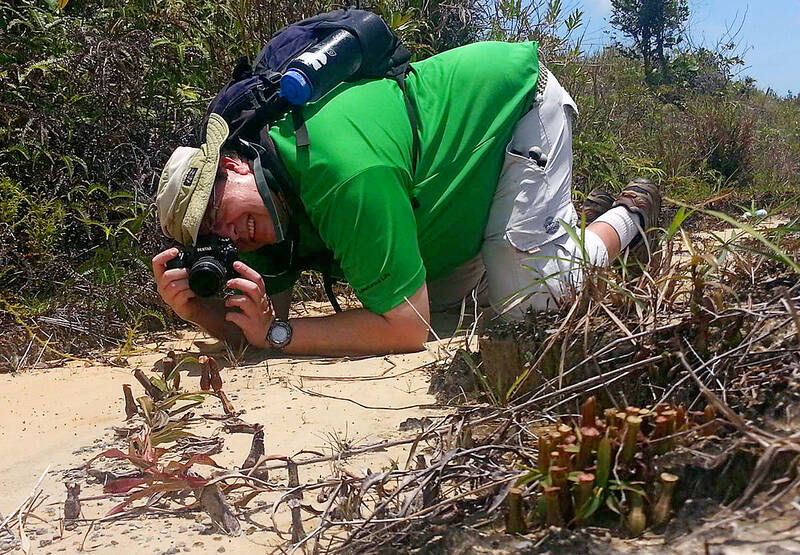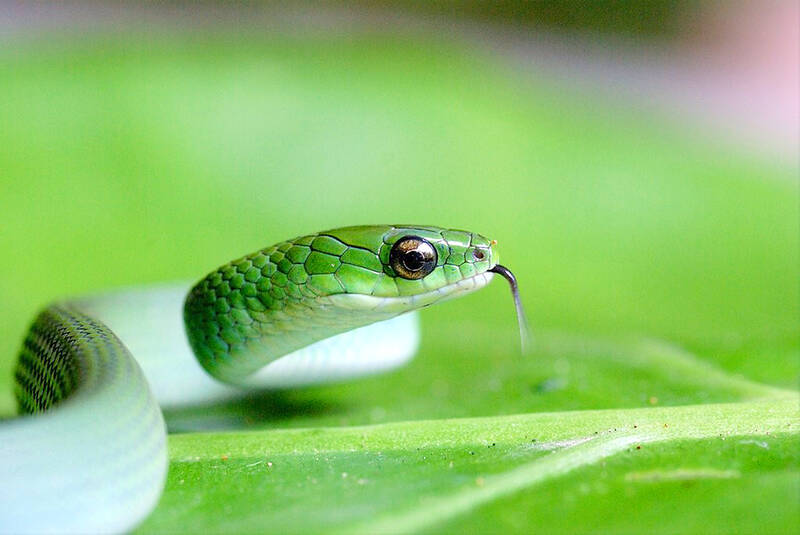Some people will never forget their first meeting with Hans Breuer, because it occurred late at night on a remote mountain road, when they noticed — to quote one of them — a large German man, “down in a concrete ditch, kicking up leaves and glancing around with a curious intensity.”
This writer’s first contact with the Dusseldorf native was entirely conventional, yet it led to a friendly correspondence that lasted until Breuer’s death in Taipei on Dec. 10. I’d been told he’d be an excellent person to talk to for an article I was putting together, so I telephoned him, and we chatted about the hobby known as herping.
He made a compelling case, explaining why nature lovers in Taiwan should go out after dark to find reptiles and amphibians in their natural habitats, and how they could do it. The conversation ended with Breuer inviting me to meet up with him and his family in Malaysia.

Photo courtesy of the Breuer family
PASSION FOR WILDLIFE
Countless individuals, among them local schoolchildren and Western expatriates, found Breuer’s passion for snakes and other wildlife infectious.
By answering strangers’ questions via www.snakesoftaiwan.com (a Web site Breuer curated with Bill Murphy, an American living in Taoyuan), visiting elementary schools to explain the role of snakes in forest ecosystems, and engaging with hikers, cyclists and others he encountered while searching Yangmingshan National Park or the North Cross-Island Highway for legless reptiles, Breuer educated thousands about the diversity of Taiwan’s snake population. Convincing those he met that these creatures should be treasured rather than feared was very much part of his mission.

Photo courtesy of the Breuer family
When taking deep-dives into local nature, things didn’t always go to plan. Dave Johnson recalls one such occasion.
“Visibly and audibly pleased with himself on discovering and promptly grabbing a particularly well-concealed snake from a ditch, Hans turned and proceeded to step on the head of a rather obvious serpent slithering across the road, causing its immediate demise!”
Johnson, a British businessman who divides his time between Taipei and Taitung, recalls his German friend as “a genuine storybook of a person.”

Photo courtesy of the Breuer family
Breuer first arrived in Taiwan in 1989, having studied Sinology at Ruhr-Universitat Bochum. Various translation and interpretation jobs followed. He once told this writer that an early client was an old-school German businessman who often visited his suppliers in Taiwan, but spoke neither English nor Chinese, and who insisted on eating every meal at McDonalds.
Later, he established a company that offered language localization services to the computer game industry. This allowed him to work from home — and in 2011 to relocate with his wife and two sons to Kuching in the Malaysian state of Sarawak. He said he had two main motives for moving away from New Taipei City’s Sanjhih District (三芝): He wanted his children to attend an international school in Kuching, and he hoped to explore Borneo’s fabulous ecosystems.
The eight-year sojourn was successful on both counts. The family thrived, and Breuer’s adventures in the jungles and national parks of Sarawak inspired his second book, A Greenhorn Naturalist in Borneo (2022). His first, titled A Cobra Hijacked My Camera Bag! Snakes and Stories from Taiwan, was published in 2012.
GOURMAND
In addition to being a herper and a birder, Breuer was a gourmand. Over the course of two visits, in 2017 and 2019, he introduced this writer’s family to some of Kuching’s finest eateries, and explained why Sarawak laksa (a spicy noodle dish) was one of humanity’s greatest inventions. Everyone who knew him knew he also adored durians.
After the family moved back to Taiwan, his social media feed featured more recipes than snakes, prompting him to post: “What has become, alas! Of the great python hunter? Spending all Sundays now cooking. Not chasing the Lindwurm. Is it old age?”
Breuer leaves behind innumerable friends, wife Lisa Liang (梁素芬), and sons Hans Jr and Karl. Hans Jr works in sales for an online tuition center. Karl is in his last year at National Taiwan University of Arts (NTUA), where he’s a mainstay of the NTUA Sharks basketball team.

That US assistance was a model for Taiwan’s spectacular development success was early recognized by policymakers and analysts. In a report to the US Congress for the fiscal year 1962, former President John F. Kennedy noted Taiwan’s “rapid economic growth,” was “producing a substantial net gain in living.” Kennedy had a stake in Taiwan’s achievements and the US’ official development assistance (ODA) in general: In September 1961, his entreaty to make the 1960s a “decade of development,” and an accompanying proposal for dedicated legislation to this end, had been formalized by congressional passage of the Foreign Assistance Act. Two

President William Lai’s (賴清德) March 13 national security speech marked a turning point. He signaled that the government was finally getting serious about a whole-of-society approach to defending the nation. The presidential office summarized his speech succinctly: “President Lai introduced 17 major strategies to respond to five major national security and united front threats Taiwan now faces: China’s threat to national sovereignty, its threats from infiltration and espionage activities targeting Taiwan’s military, its threats aimed at obscuring the national identity of the people of Taiwan, its threats from united front infiltration into Taiwanese society through cross-strait exchanges, and its threats from

Despite the intense sunshine, we were hardly breaking a sweat as we cruised along the flat, dedicated bike lane, well protected from the heat by a canopy of trees. The electric assist on the bikes likely made a difference, too. Far removed from the bustle and noise of the Taichung traffic, we admired the serene rural scenery, making our way over rivers, alongside rice paddies and through pear orchards. Our route for the day covered two bike paths that connect in Fengyuan District (豐原) and are best done together. The Hou-Feng Bike Path (后豐鐵馬道) runs southward from Houli District (后里) while the

March 31 to April 6 On May 13, 1950, National Taiwan University Hospital otolaryngologist Su You-peng (蘇友鵬) was summoned to the director’s office. He thought someone had complained about him practicing the violin at night, but when he entered the room, he knew something was terribly wrong. He saw several burly men who appeared to be government secret agents, and three other resident doctors: internist Hsu Chiang (許強), dermatologist Hu Pao-chen (胡寶珍) and ophthalmologist Hu Hsin-lin (胡鑫麟). They were handcuffed, herded onto two jeeps and taken to the Secrecy Bureau (保密局) for questioning. Su was still in his doctor’s robes at